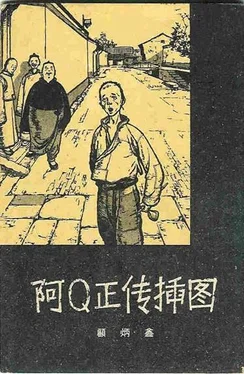阿Q被抬上了一辆没有蓬的车,几个短衣人物也和他同坐在一处。这车立刻走动了,前面是一班背着洋炮的兵们和团丁,两旁是许多张着嘴的看客,后面怎样,阿Q没有见。但他突然觉到了:这岂不是去杀头么?他一急,两眼发黑,耳朵里〔口皇〕的一声,似乎发昏了。然而他又没有全发昏,有时虽然着急,有时却也泰然;他意思之间,似乎觉得人生天地间,大约本来有时也未免要杀头的。
他还认得路,于是有些诧异了:怎么不向着法场走呢?他不知道这是在游街,在示众。但即使知道也一样,他不过便以为人生天地间,大约本来有时也未免要游街要示众罢了。
他省悟了,这是绕到法场去的路,这一定是“嚓”的去杀头。他惘惘的向左右看,全跟着马蚁似的人,而在无意中,却在路旁的人丛中发见了一个吴妈。很久违,伊原来在城里做工了。阿Q忽然很羞愧自己没志气:竟没有唱几句戏。他的思想仿佛旋风似的在脑里一回旋:《小孤孀上坟》欠堂皇,《龙虎斗》里的“悔不该…”也太乏,还是“手执钢鞭将你打”罢。他同时想手一扬,才记得这两手原来都捆着,于是“手执钢鞭”也不唱了。
“过了二十年又是一个…”阿Q在百忙中,“无师自通”的说出半句从来不
说的话。
“好!!!”从人丛里,便发出豺狼的嗥叫一般的声音来。
车子不住的前行,阿Q在喝采声中,轮转眼睛去看吴妈,似乎伊一向并没有见他,却只是出神的看着兵们背上的洋炮。
阿Q于是再看那些喝采的人们。
这刹那中,他的思想又仿佛旋风似的在脑里一回旋了。四年之前,他曾在山脚下遇见一只饿狼,永是不近不远的跟定他,要吃他的肉。他那时吓得几乎要死,幸而手里有一柄斫柴刀,才得仗这壮了胆,支持到未庄;可是永远记得那狼眼睛,又凶又怯,闪闪的像两颗鬼火,似乎远远的来穿透了他的皮肉。而这回他又看见从来没有见过的更可怕的眼睛了,又钝又锋利,不但已经咀嚼了他的话,并且还要咀嚼他皮肉以外的东西,永是不近不远的跟他走。
这些眼睛们似乎连成一气,已经在那里咬他的灵魂。
“救命,…”
然而阿Q没有说。他早就两眼发黑,耳朵里嗡的一声,觉得全身仿佛微尘似的迸散了。
至于当时的影响,最大的倒反在举人老爷,因为终于没有追赃,他全家都号啕了。其次是赵府,非特秀才因为上城去报官,被不好的革命党剪了辫子,而且又破费了二十千的赏钱,所以全家也号啕了。从这一天以来,他们便渐渐的都发生了遗老的气味。
至于舆论,在未庄是无异议,自然都说阿Q坏,被枪毙便是他的坏的证据:不坏又何至于被枪毙呢?而城里的舆论却不佳,他们多半不满足,以为枪毙并无杀头这般好看;而且那是怎样的一个可笑的死囚呵,游了那么久的街,竟没有唱一句戏:他们白跟一趟了。
一九二一年十二月
。

Lu Xun (traditional Chinese: 魯迅; simplified Chinese: 鲁迅; pinyin: Lǔ Xùn) or Lu Hsün (Wade-Giles), was the pen name of Zhou Shuren (traditional Chinese: 周樹人; simplified Chinese: 周树人; pinyin: Zhōu Shùrén; Wade-Giles: Chou Shu-jen)
Lu Xun (1881-1936) was a great man of letters, as well as a thinker and revolutionary in modern China, and also the founder of modern literature in China. The literary style of modern Chinese fiction was formed based on foreign fiction and the reformed traditional Chinese storytelling scripts; Lu Xun was a great pioneer in this reform.
"A Madman's Diary," a short story published in New Youth (a progressive journal of that time) in May 1918, had epochal significance, marking the beginning of a brand new literary era. This story attempts to expose the maladies of feudal patriarchy and the feudal code ethics. However, in the novel, Lu Xun doesn't describe the harms of feudal patriarchy and the oppression borne by the madman in detail; instead he points to the cruel nature of feudal ethics through the mad man's eyes, derangement, and frenzied words. " A Madman's Diary " denounces the cannibalistic ethics of feudal society with a most sobering realistic spirit. Artistically, this story is shaded with subtle symbolism. Before " A Madman's Diary " was published, poetry and prose written in the vernacular had already appeared. But it was " A Madman's Diary " that contained true revolutionary thought and seamlessly blended a thoroughly anti-feudal spirit and new art forms. The story is regarded as the first piece of modern Chinese fiction.
Lu Xun's short stories are brought together in two collections – Call to Arms and Wandering.
Call to Arms includes 14 works written between 1918 and 1922. Works in this collection were marked by the strong patriotic and revolutionary passion that prevailed in China during the May 4th Movement (1919). Wandering is made up of 11 stories including "The New Year Sacrifice," "In the Wine Shop," and "Soap" written in 1924, and "The Misanthrope," "Regret for the Past," and "Divorce" written in 1925.
Wandering reflects Lu Xun's spiritual depression in the mid-1920s and his unending search for the truth. "Kong Yiji" describes an intellect inflicted by the Imperial examination system. The story is written with a laconic and simple structure and in concise language. It castigates the evil of the examination system in trampling and destroying people's lives. "Medicine" is another famous short story exposing the life- destroying feudal system. It depicts not only the uneducated common people who are devoured by feudal superstition, but also a young revolutionary who is killed by the sword of feudal autocracy. One incident in the story, where Hua Laoshuan buys a bun soaked in martyr's blood in hope of curing his son's disease, has become a well-known literary quotation referring to the need for enlightenment.
Lu Xun cared about peasants' lives very much. Many stories in Call to Arms and Wandering truthfully depict peasants' tragic lives after the 1911 Revolution. "Storm" reflects the never-changing rural life after Zhang Xun's restoration by describing a small disturbance in the boatman Qijin's family in Luxian County.
"Hometown" is a short story known to every household in China. Through the author's first-person witnessing, of especially boyhood friend Runtu's experience, the story opens up, before reader's eyes, a fig of the tragic lives led by Chinese peasants in the 1920s. The story points to the countless tragedies peasants were forced to endure due to hunger, too many children, heavy taxes, wars, bandits, corrupt officials, and cruel landlords. The author's sympathy for and concern about the benumbed peasants and their sufferings has stirred generation after generation of readers' hearts.
The "True Story of Ah Q," which is included in Call to Arms, is Lu Xun's most representative work. The story is set in Chinese society around the 1911 Revolution. The novel, through describing Ah Q's tragic story of oppression, trying to resist oppression, and being killed by the reactionary forces, reveals the class confrontations in the rural areas at that time and criticizes the bourgeoisie's unthoroughness to and alienation from the masses in leading the 1911 Revolution. The author, on one hand, showed great sympathy for Ah Q's unfortunate experiences, while on the other hand, expressed anger at his being so easily discouraged. Through criticizing Ah Q's self-deception, Lu Xun hoped to waken Chinese peasants' awareness and desire for revolution. The "True Story of Ah Q" has gained worldwide fame and is one of the greatest works in the history of Chinese literature.
Читать дальше













